【初中·外教公開(kāi)課】一起加入外教Mr. Simon的奇妙閱讀之旅吧,!
發(fā)布日期:2021-11-23 信息來(lái)源:
11月22日,,初中英語(yǔ)高端英語(yǔ)項(xiàng)目組初一外教Mr. Simon為學(xué)生們帶來(lái)了一次奇妙的閱讀之旅,。有趣的內(nèi)容,生動(dòng)的教學(xué),,把小說(shuō)“查理與巧克力工廠”以獨(dú)特的方式呈現(xiàn)給學(xué)生,,讓學(xué)生在閱讀中體驗(yàn)英語(yǔ)學(xué)習(xí)的樂(lè)趣,。全體高端英語(yǔ)項(xiàng)目中外籍教師觀摩聽(tīng)課并評(píng)課,。
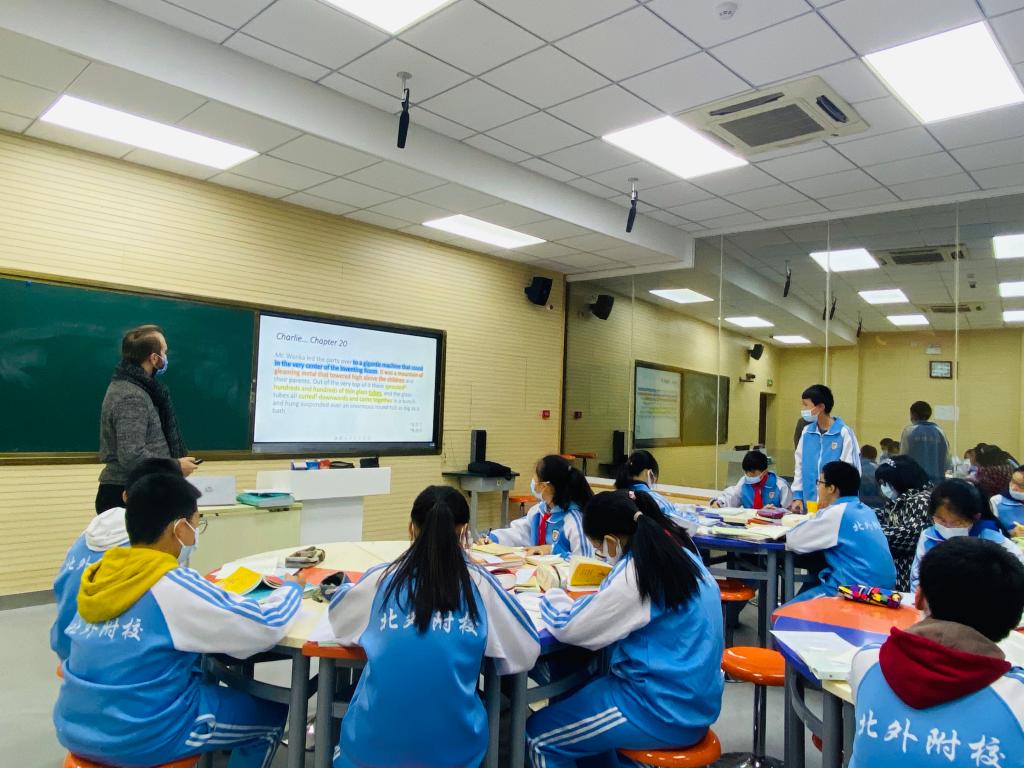
Mr. Simon首先利用小說(shuō)中的Violet這一角色圖片引導(dǎo)學(xué)生預(yù)測(cè)可能會(huì)發(fā)生在這個(gè)小女孩身上的故事。發(fā)散并打開(kāi)學(xué)生的思維,,把學(xué)生的注意力引到本節(jié)課即將開(kāi)啟的故事情節(jié)中,。學(xué)生們通過(guò)形象的圖片很快展開(kāi)了自己的想象。在引發(fā)學(xué)生的好奇心后,,教師開(kāi)始本章節(jié)的詞匯教學(xué),。Mr. Simon為每個(gè)新詞都精心設(shè)計(jì)了生動(dòng)的圖片和動(dòng)畫(huà)來(lái)幫助學(xué)生理解,并配合例句來(lái)構(gòu)建單詞的使用意義,,使學(xué)生不僅學(xué)到了很多新詞匯并且也激發(fā)了他們表達(dá)的欲望,,有趣的詞匯學(xué)習(xí)讓學(xué)生們歡笑聲不斷。
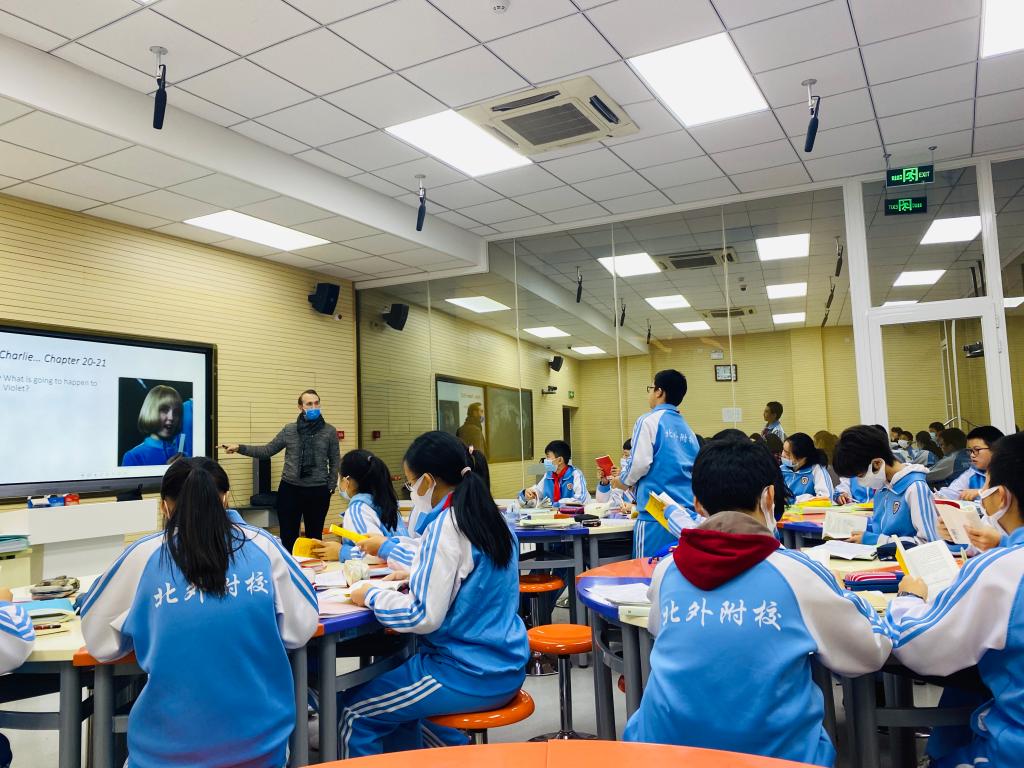
掃除詞匯障礙后接下來(lái)就開(kāi)啟了真正的閱讀之旅,。Mr. Simon設(shè)計(jì)了層層遞進(jìn)的閱讀任務(wù),,從略讀、泛讀到精讀,,再到學(xué)生自己討論,,一步步引導(dǎo)學(xué)生走進(jìn)故事情節(jié)中,并培養(yǎng)學(xué)生的閱讀微技能,。值得一提的是,,Mr. Simon利用自己精心設(shè)計(jì)的學(xué)案讓學(xué)生帶著問(wèn)題去閱讀并通過(guò)在屏幕上用不同顏色字體標(biāo)注的方式帶著學(xué)生一起閱讀加深理解,學(xué)生在這個(gè)過(guò)程中也學(xué)會(huì)了如何書(shū)上標(biāo)注筆記,。過(guò)程中Mr. Simon不斷關(guān)注每位同學(xué)的完成情況,。
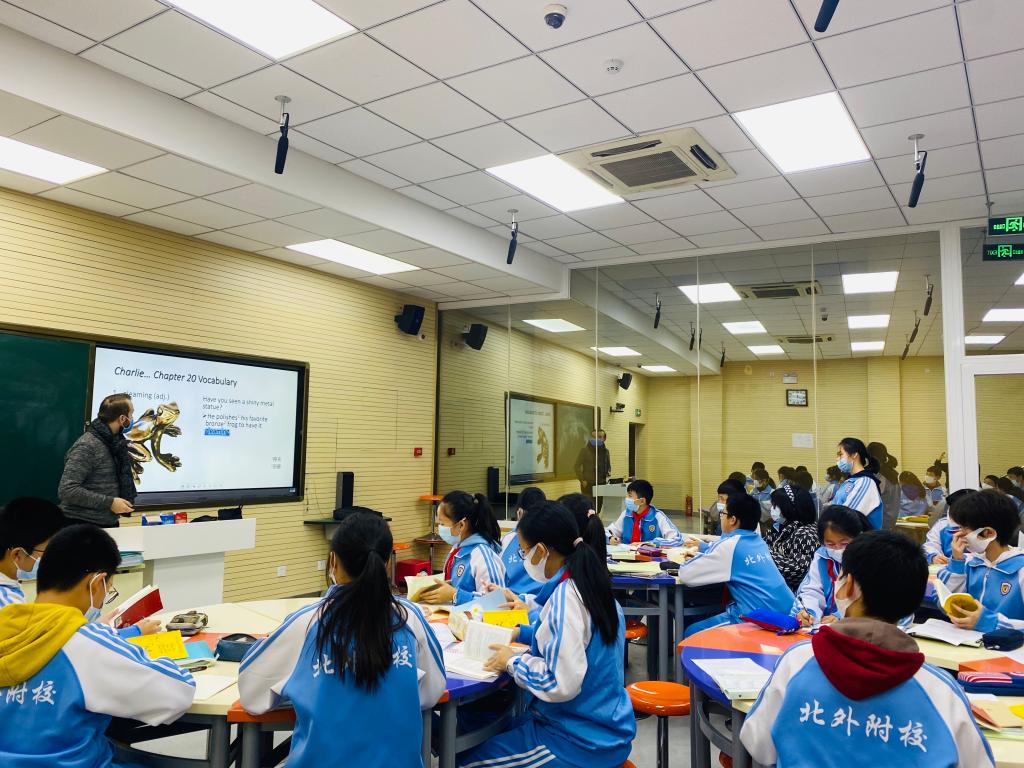
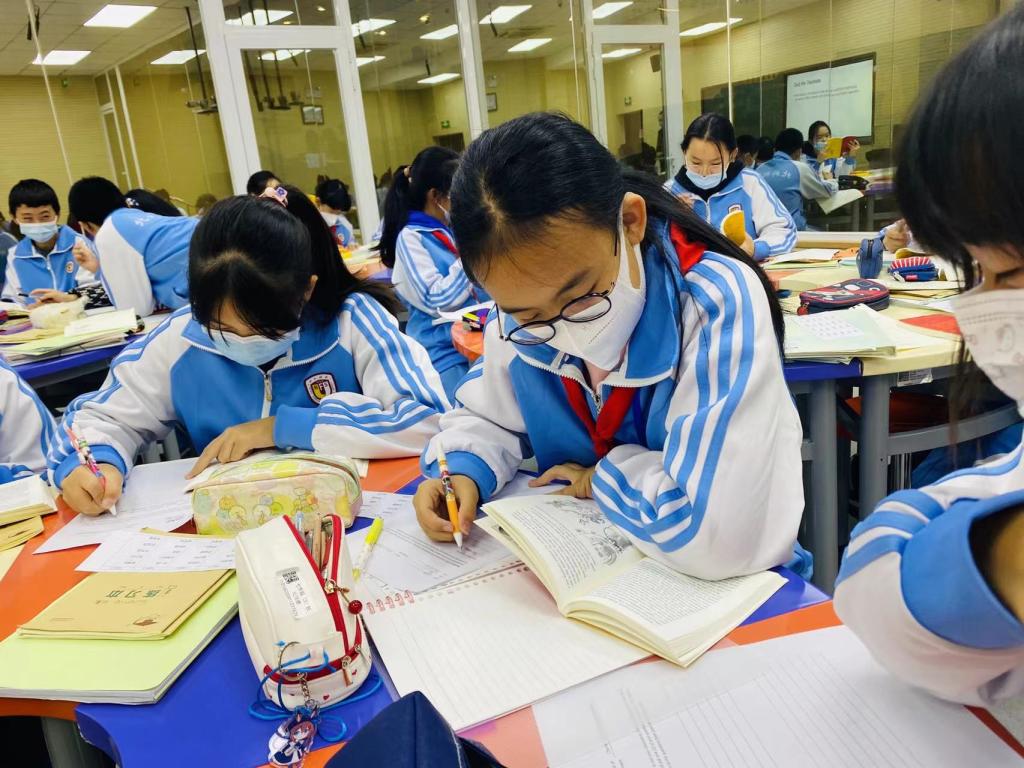
最后,Mr. Simon在讀后環(huán)節(jié)中讓學(xué)生在小組內(nèi)自由提問(wèn)并解答小伙伴的問(wèn)題,,每個(gè)小組都展開(kāi)了熱烈的討論,,大家積極分享著自己的問(wèn)題和答案并在班級(jí)展示。從同學(xué)們的展示中可以看出他們?cè)陂喿x中的收獲滿(mǎn)滿(mǎn),。
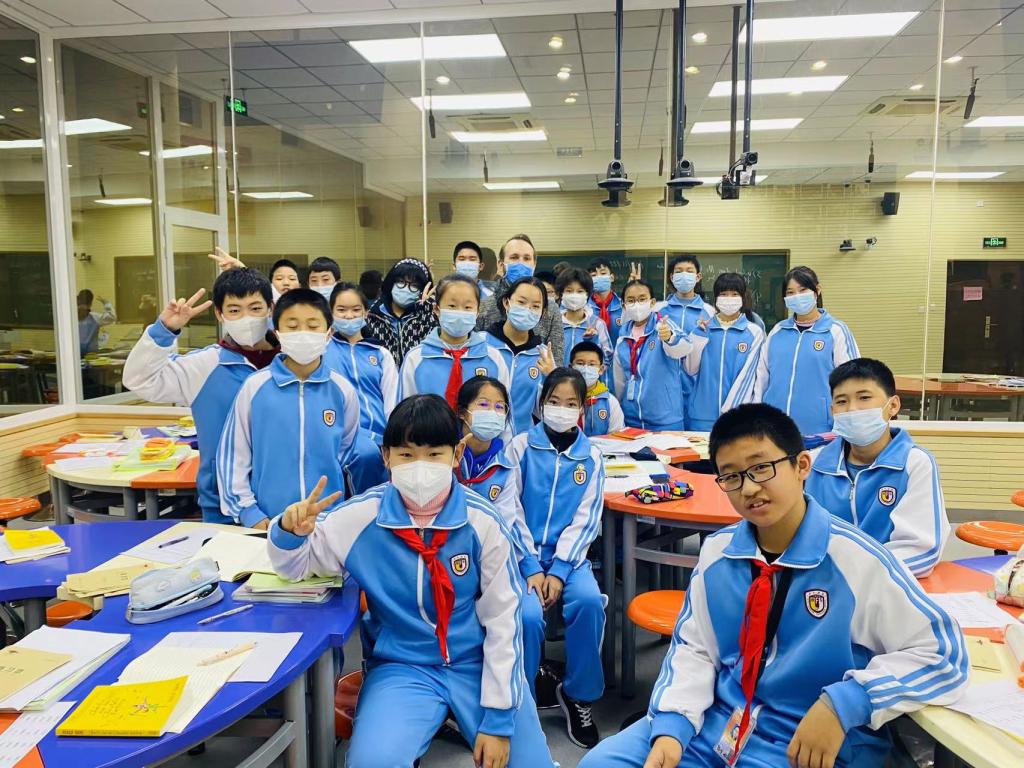
課后所有聽(tīng)課老師們對(duì)Mr. Simon這節(jié)課展開(kāi)了教研討論,,大家積極提出了自己寶貴的意見(jiàn),充分肯定了Mr. Simon對(duì)小說(shuō)閱讀課的精巧設(shè)計(jì),。同時(shí)本次外教公開(kāi)課為我校中外籍教師提供了一次寶貴的閱讀課交流契機(jī)并加深了彼此的交流,。
附:外教Mr. Simon公開(kāi)課反思
Reflection on Open Class
Content: Charlie and the Chocolate Factory, Chapter 20
For my open class, I covered chapter 20 from Charlie and the Chocolate Factory with my class. At the start we went over what ‘will happen’ to Violet (a character from the book) and then what ‘is happening’ to Violet (showing pictures of the character from the 2005 movie version). After priming them of the content, we went into the vocabulary (see ppt and/ or lesson plan for the words) that they will notice in the chapter. We first viewed how to use these new words then stated the new words in sentences, then learned the meanings. The students, as always are encouraged to write down the new words in the vocabulary notebooks and we would then review and use them in the writing class. After going over the vocabulary, we covered how to take notes (i.e., to annotate) and how to highlight and underline important information in the text. Then we dove into the ‘scanning’ questions to focus their reading for key points of the chapter and understanding the ‘order of happenings’ (the skill that was focused for the class). We would read one or a couple questions then read a section the chapter to find the answers then read one or a couple more questions and repeat. After we were done reading, I asked the students to work with their ‘table-mates’ to come up with questions from the chapter to ‘quiz’ their other classmates. I wrote the questions each table came up with and the table that was able to answer these questions earned points for something special.
Overall, I thought it was a relative successful class. The students did seem to enjoy the class, while being engaged and the subject matter not being too easy nor too difficult. There were some issues I did notice in my own ppt, either I over-looked these errors or copied the wrong ppt. However, I would defiantly make sure that ALL the vocabulary words would be underlined ALL the time (found some vocabulary words, for whatever reason, not underlined in the ppt). Also, I realized that with some students I needed to be CLEARER or repeat that the ‘quiz questions’ needed to be from the chapter we read and not from other parts of the book, but did deal with those particular issues quickly as they popped up. This class lesson would defiantly be more successful if broken up more, due to only having 40 minutes. Either read half of the chapter one day and the other half the next while still going over the scanning-questions and possibly having a ‘mid-chapter’ formative assessment (the ‘quizzing the classmates’ activity was a formative assessment as well as an activity to engage their inquiry skills) or some other way.
Regardless, I believe the students are now getting more familiar with not only how we in English order cause and effect in a passage/ paragraph, but are getting more familiar with the words that ‘transition’ to each ‘happening.’ This will be more focused later, specifically in the writing course. They also took away more English vocabulary words to use; therefore, I again believe the course was a relative success.
在我的公開(kāi)課上,,我和同學(xué)們一起學(xué)習(xí)了《查理和巧克力工廠》的第20章。一開(kāi)始,,我們討論了維奧萊特(書(shū)中的一個(gè)角色)將會(huì)發(fā)生什么,,然后討論了維奧萊特將會(huì)發(fā)生什么(展示了2005年電影版中的角色照片)。給他們講解完內(nèi)容后,,我們進(jìn)入他們會(huì)在本章中注意到的詞匯學(xué)習(xí)中(單詞見(jiàn)ppt和/或教案),。我們首先觀察如何使用這些新單詞,然后在句子中陳述新單詞,,然后學(xué)習(xí)意思,。學(xué)生們一如既往地被鼓勵(lì)在詞匯筆記本上寫(xiě)下新單詞,然后我們會(huì)在寫(xiě)作課上復(fù)習(xí)和使用它們,。在復(fù)習(xí)了詞匯之后,,我們學(xué)習(xí)了如何做筆記(也就是注釋)以及如何突出和強(qiáng)調(diào)文本中的重要信息。然后,,我們進(jìn)入“掃描”問(wèn)題,,讓他們集中閱讀本章的要點(diǎn),并理解“發(fā)生的順序”(這是課堂上的重點(diǎn)技能),。我們會(huì)讀一個(gè)或幾個(gè)問(wèn)題,,然后讀本章的一個(gè)部分來(lái)找到答案,然后再讀一個(gè)或幾個(gè)問(wèn)題,,然后重復(fù),。在我們讀完之后,我讓學(xué)生和他們的“同桌”一起想出本章的問(wèn)題來(lái)“測(cè)試”他們的其他同學(xué),。我寫(xiě)下了同學(xué)們提出的問(wèn)題,,能回答這些問(wèn)題的小組贏得了分?jǐn)?shù)。
總的來(lái)說(shuō),,我認(rèn)為這是一堂相對(duì)成功的課,。學(xué)生們似乎確實(shí)很喜歡這門(mén)課,因?yàn)樗麄兒芡度?,而且這門(mén)課設(shè)計(jì)難度適中,。此外,我意識(shí)到,,對(duì)一些學(xué)生來(lái)說(shuō),,我語(yǔ)言需要更清晰一些,但是當(dāng)某些特定的問(wèn)題出現(xiàn)時(shí),,我會(huì)很快處理它們,。由于只有40分鐘的時(shí)間,如果能用更多的時(shí)間,,這節(jié)課會(huì)更成功,。 (對(duì)同學(xué)的“測(cè)驗(yàn)”活動(dòng)是一種形成性評(píng)估,,也是一種激發(fā)他們探究技能的活動(dòng))??傊?,我相信學(xué)生們現(xiàn)在不僅越來(lái)越熟悉我們?cè)谟⒄Z(yǔ)中如何排列一個(gè)段落的因果關(guān)系,也越來(lái)越熟悉段落結(jié)構(gòu),,之后我們會(huì)有更多類(lèi)似的練習(xí),,特別是在寫(xiě)作課程中。他們也學(xué)到了更多的英語(yǔ)詞匯,。因此,,我再次相信這門(mén)課程是相對(duì)成功的。
熱點(diǎn)新聞
-
2024-05-24
北外附校邀請(qǐng)北外專(zhuān)家舉行高中學(xué)生法制講座
-
2023-12-26
【明德講堂】弘揚(yáng)外交精神 傳播外交智慧---外交官?gòu)垏?guó)斌為北外附校初一年級(jí)師生做主題講座
-
2023-12-14
揚(yáng)復(fù)語(yǔ)優(yōu)勢(shì) 促多元發(fā)展│北外附校舉辦2023年第二場(chǎng)校長(zhǎng)午餐會(huì)
-
2023-11-17
【初中·教育教學(xué)】“會(huì)”診學(xué)業(yè)質(zhì)量 賦能學(xué)生成長(zhǎng)
-
2022-05-30
小學(xué)教育簡(jiǎn)介(2022年5月版)




